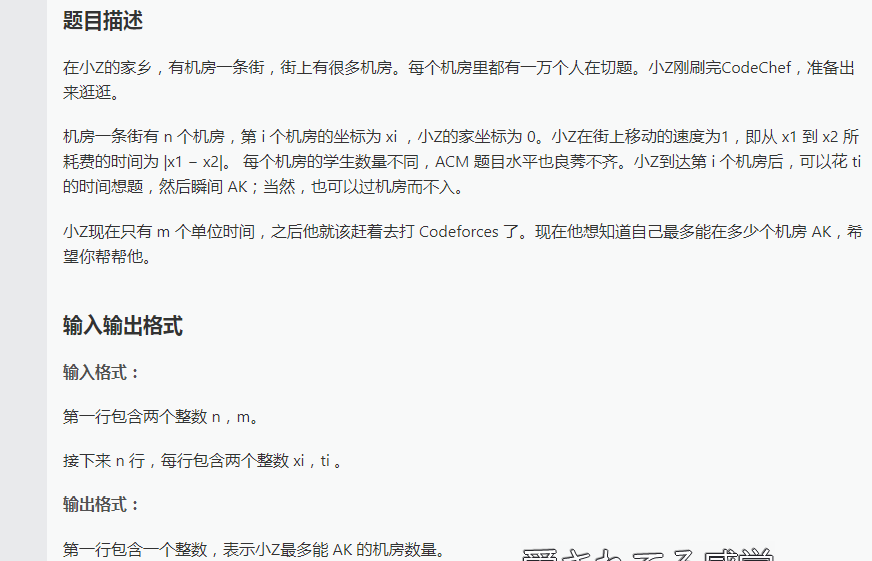luogu P2107 小Z的AK计划
最近复习了一下堆,于是去luogu上找一些简单题写一写

贪心的想,小z不会到一半以后回头去Ak,因为这样从时间上想肯定是不优的,他可以早在之间经过时就AK
所以我们可以将所有机房按照横坐标排序
可以想到的是,我们最后肯定是要走过所有的机房,也就是说路程消耗的疲劳值是不可避免的。
我们只能尽可能的减少小ZAK所花费的时间
贪心的考虑,当我们在机房Ak所花费的时间长时,我们可能能在这个时间内AK更多的机房
所以当时间出问题时,我们肯定要取出堆顶删除以便AK更多的机房。
我们维护一个关于机房AK时间的大根堆,每次先假定要Ak,然后将时间丢入堆中,所到当前机房所花费的时间比总时间大,则移除堆顶
但是需要注意的是,移除堆顶时,我们的答案并不需要减少,因为刚刚插入一个,然后超过了总时间,在移除一个,刚刚好抵消
至于为什么只需要移除堆顶:
我在题解上看到过用while循环去移除堆顶的,然而实际并不需要,因为我们刚刚插入一个新元素
对于这个元素来说,若他不是堆中最大元素,显然我们移除最大的肯定就把这个新元素占的地方给腾出来了
若是最大元素,那么直接删除就等于过而不入,对答案没有影响
这样我们就能AC这道题
嗯好吧,其实思路是有些问题的
因为是这样的,可能的是,我们在当前这个机房,即使过而不入,单单是走过去,在加上之前的选择并AK机房耗费的时间就把总时间给超了
这样我们不得不多次弹出堆顶,同时在弹出第一个堆顶后,剩下的弹出多少个,答案数就要减去多少
好在这题没有卡
不会且没看stl的我选择手写二叉堆
1 #include<bits/stdc++.h> 2 #define ll long long 3 #define uint unsigned int 4 #define ull unsigned long long 5 using namespace std; 6 const int maxn = 110000; 7 struct shiki { 8 ll x, t; 9 }a[maxn]; 10 ll heap[maxn << 1], tot = 0, num = 0; 11 ll n, m, top = 0; 12 ll ans = 0; 13 14 inline ll read() { 15 ll x = 0, y = 1; 16 char ch = getchar(); 17 while(!isdigit(ch)) { 18 if(ch == '-') y = -1; 19 ch = getchar(); 20 } 21 while(isdigit(ch)) { 22 x = (x << 1) + (x << 3) + ch - '0'; 23 ch = getchar(); 24 } 25 return x * y; 26 } 27 28 inline void up(int p) { 29 while(p > 1) { 30 if(heap[p] > heap[p / 2]) { 31 swap(heap[p], heap[p / 2]); 32 p /= 2; 33 } 34 else break; 35 } 36 } 37 38 inline void down(int p) { 39 int s = p * 2; 40 while(s <= tot) { 41 if(s < tot && heap[s] < heap[s + 1]) s++; 42 if(heap[p] < heap[s]) { 43 swap(heap[s], heap[p]); 44 p = s, s = p >> 1; 45 } 46 else break; 47 } 48 } 49 50 inline void extract() { 51 heap[1] = heap[tot--]; 52 down(1); 53 } 54 55 inline void insert(ll k) { 56 heap[++tot] = k; 57 up(tot); 58 } 59 60 inline bool cmp(shiki a, shiki b) { 61 return a.x < b.x;} 62 63 inline int get_top(){return heap[1];} 64 65 int main() { 66 n = read(), m = read(); 67 for(int i = 1; i <= n; ++i) { 68 ll x = read(), t = read(); 69 if(x <= m && t <= m) { 70 a[++top].x = x; 71 a[top].t = t; 72 } 73 } 74 sort(a + 1, a + top + 1, cmp); 75 for(int i = 1; i <= top; ++i) { 76 insert(a[i].t); 77 num += (a[i].x - a[i - 1].x) + a[i].t; 78 if(num <= m) ans++; 79 if(num > m) { 80 num -= get_top(); 81 extract(); 82 } 83 } 84 printf("%lld\n", ans); 85 return 0; 86 }

